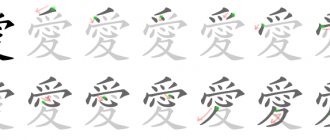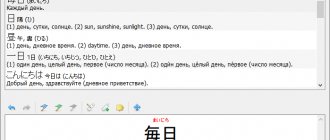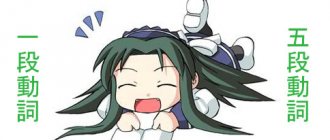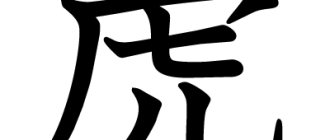A selection of basic words and expressions in Japanese
When you start learning a foreign language, you are always glad that you can now say this or that word in it. It turns out to describe one object, another, it seems as if the world around is expanding. However, where to look for all this vocabulary? Beginners probably dream of a list that contains basic Japanese words with translation into Russian. Some people's soul requires a selection of beautiful words in Japanese in order to touch the beautiful, while others simply need popular Japanese words that can be found, for example, in anime. In this article we will share with you tables that contain just such vocabulary. Below you will find several selections with Japanese words with translation and Russian pronunciation .
Phonetics and pronunciation in Japanese
Phonetics and pronunciation in Japanese
Pronunciation in Japanese is not very difficult, but it has its own characteristics. Firstly, almost all syllables in Japanese are open (consonant + vowel). There are few closed syllables, and in Japanese they can only end in n. Secondly, the Japanese language does not have many sounds that are in Russian (“l”, “sh”, “y”), and vice versa, some sounds differ from those familiar to us.
Let's take a closer look at the pronunciation of vowels.
あ – similar to the stressed Russian “a”, but the Japanese “a” is less open
い – like Russian i. The consonant before it is always soft.
え – should be pronounced clearly, but less openly, Japanese え is more like “e” after hard consonants.
お–clearly, like the Russian stressed “o”
Japanese has long and short vowels. Long vowels are 2 times longer than short vowels. Long and short vowels must always be distinguished, since some words differ only in the length of the vowels. In transcription, the length of a vowel is indicated by a colon or a line above the letter.
In hiragana, longitude is indicated either by repeating the corresponding vowel or the vowel う after お (as in the word けんこう kenko: "health"), in katakana - by a horizontal bar after the vowel. The combination えい in some cases is read as a long “e” (for example, the word せんせい (sensei) can be pronounced as sensei or sensei:, and がくせい (gakusei) as gakusei or gakuse:).
“U” and “i” between voiceless consonants are reduced, that is, they are almost not pronounced. For example, the words すこし “a little” or そして “then” sound almost like “mow” and “suck.” Also, the reduction rule sometimes applies to the case if “I” or “U” are at the end of the word after a voiceless consonant, for example, the linking verb です is read as “des”, and the ending of the verb ます is read as “mas”.
Now let's talk about the pronunciation of consonants.
K in the series か, き, く, け, こ is similar to the Russian k.
In the syllables さ sa, す su, せ se, そ so, the first consonant is similar to the Russian “s”. The consonant in the syllable し si looks like a cross between the soft Russian s and shch.
In た ta, て te, と that - like t in Russian. In ち ti looks like a cross between t' and h'. The ts in the syllable つ tsu is similar to the Russian “ts”.
In the syllables な na, に ni, ぬ well, ね ne, の but the consonant is similar to the Russian “n”.
X in the syllables は ha, へ he, ほ ho is pronounced aspirated and easy. In the syllable ひ hi is like a soft x. In the syllable ふ fu, the “f” is pronounced easily, with aspiration.
M is the first sound in the syllables ま ma, み mi, む mu, め me, も mo. Identical to Russian m.
In や i, ゆ yu, よ е the first consonant is th. These syllables are similar to the Russian letters i, yu, ё.
In the syllables ら ra, り ri, る ru, れ re, ろ ro, the consonant is less booming than our “r”, it is formed almost the same as in Russian, but with one blow of the tongue on the palate, which is why it becomes a kind of middle between r and l. Some peoples claim that there is no “r” in Japanese, but only “l”.
The consonant of the syllable わ wa resembles something between the Russians в and у (cf. English w).
The syllable を is pronounced like "o".
The consonant ん is read as “m” before m, b and p (かんぱい kampai – toast, しんぶん shimbun – newspaper), as a nasal before k and g – (けんか kenka “quarrel”), and as “n” in other cases.
Consonants in voiced rows are pronounced:
G in the series "ha" is similar to the Russian "g". When the syllables が ga, ぎgi, ぐ gu, げ ge, ご go are in the middle of a word, the “g” is pronounced with a nasal sound similar to the English ŋ (for example, in the word あげる ageru “to raise”).
In the syllables ざ dza, づ, ず dzu, ぜ dze, ぞ dzo, when they are written at the beginning or middle of a word after n, a continuous “dz” is pronounced. In other cases - as Russian z. In the syllables じ, ぢ, dzi is pronounced softly and with a lisping sound.
In だ yes, で de, ど do consonant = hard Russian “d”.
The first sound in the series ば ba, び bi, ぶ bu, べ be, ぼ bo is similar to the Russian “b”.
In the syllables ぱ pa, ぴ pi, ぷ pu, ぺ pe, ぽ po, the consonant is similar to the Russian “p”.
There are also doubled consonants in Japanese. They are indicated by a small つ before a syllable with a double consonant: けっか kekka, いったい ittai, いっぽん ippon, etc.
In conclusion, I would like to say that in general, mastering Japanese pronunciation is much easier for Russian-speaking people than, for example, for English speakers or speakers of other languages.
This is due to the fact that the Russian language includes almost all the sounds that are found in the Japanese language.
In order to improve your pronunciation, I advise you to listen to Japanese speech as much as possible and practice listening. Listen carefully and pay attention to the intonation and pronunciation and then proceed to practice - try to exactly repeat after the announcer, and then your pronunciation will noticeably improve after some time of regular practice.
Simple words in Japanese
If you've ever wondered how to say the word "Japan" in Japanese, then this collection is for you. It will allow you to become familiar with basic Japanese words and remember their transcription and translation. When reading Japanese words in Russian, keep in mind: “:” denotes a long sound, and the vowels [u] and [i] in the syllables “ku”, “ki” and “su”, “si” are reduced.
| Word in Japanese | Writing in Hiragana | Transcription | Translation |
| 日本 | にほん | nihon | Japan |
| 日本語 | にほんご | nihongo | Japanese |
| ロシア | ろしあ | rossia | Russia |
| ロシア語 | ろしあご | rosia-go | Russian language |
| 国 | くに | cunnilingus | a country |
| 私 | わたし | watashi | I |
| あなた | あなた | anata | you, you (politely about someone) |
| あなたたち | あなたたち | anata-tati | you (about several people) |
| 人 | ひと | hito | Human |
| 男 | おとこ | otoko | man |
| 女 | おんな | He is at | woman |
| 子 | こ | co | child |
| 父 | ちち | titi | father |
| 母 | はは | haha | mother |
| 息子 | むすこ | musuko | son |
| 娘 | むすめ | Musume | daughter |
| 日 | ひ | hee | day |
| 月 | つき | tsuki | month |
| 年 | とし | tosi | year |
| 朝 | あさ | asa | morning |
| 昼 | ひる | Hiru | day |
| 夜 | よる | Yoru | evening night |
| 冬 | ふゆ | wow | winter |
| 春 | はる | Haru | spring |
| 夏 | なつ | natsu | summer |
| 秋 | あき | aki | autumn |
| 本 | ほん | hon. | book |
| 映画 | えいが | Eiga | movie |
| 質問 | しつもん | shitsumon | question |
| 答え | こたえ | kotae | answer |
| 家 | いえ | ie | house |
| 頭 | あたま | athame | head |
| 手 | て | te | arm hand) |
| 腕 | うで | ude | arm (from shoulder to hand) |
| 指 | ゆび | yubi | finger |
| 足 | あし | asi | leg |
| 顔 | かお | kao | face |
| 目 | め | meh | eye |
| 鼻 | はな | Khan | nose |
| 口 | くち | cootie | mouth |
| 耳 | みみ | Mimi | ear |
| 良い | いい | th | good |
| 悪い | わるい | cook | bad |
| 大きい | おおきい | Okie: | big |
| 小さい | ちいさい | ti:sai | small |
| 美しい | うつくしい | utsukushi: | Beautiful |
| 可愛い | かわいい | kawaii: | Cute |
| 美味しい | おいしい | oisi: | delicious |
| 怖い | こわい | forge | scary |
| 新しい | あたらしい | atarashi: | new |
| 古い | ふるい | Fury | old |
| 高い | たかい | like that | high |
| 低い | ひくい | hikui | short |
| ある | ある | aru | to be (about inanimate objects) |
| いる | いる | iru | be (about people, animals, etc.) |
| 話す | はなす | hanasu | speak |
| する | する | sura | do |
| 来る | くる | kuru | come |
| 行く | いく | iku | leave, go |
| 使う | つかう | zukau | use |
| 分かる | わかる | vakaru | understand |
| 考える | かんがえる | Kangaeru | think |
| 立つ | たつ | tatsu | stand |
| 座る | すわる | suwaru | sit |
| 寝る | ねる | neru | go to sleep |
| 起きる | おきる | okira | get up |
| 一 | いち | iti | one |
| 二 | に | neither | two |
| 三 | さん | san | three |
| 四 | し | si | four |
| 五 | ご | th | five |
| 六 | ろく | Roku | six |
| 七 | しち | City | seven |
| 八 | はち | hati | eight |
| 九 | きゅう | kyu: | nine |
| 十 | じゅう | ju: | ten |
| 百 | ひゃく | hyaku | one hundred |
| 千 | せん | sen | thousand |
Of course, these are not all the Japanese words that beginners may need, but if you are just starting to learn Japanese, then this list may come in handy.
Accent
Typically, Japanese words, titles and names in Russian are pronounced with emphasis on the penultimate syllable, and such emphasis is generally preferable in doubtful cases. However, there are a number of exceptions, in particular:
- Words ending in “on”
,
“an”
,
“mono”
and
“ko”
(in three-syllable words) are pronounced with emphasis on the last syllable:
“ippOn”
,
“jomOn”
,
“kimonO”
,
“nuriko”
, but
“ heiko"
,
"tenno"
,
"nagano"
.
If the ending is “en”
, you can do both (
seinEn
-
seinen
). - Words ending in diphthongs “ai/ey/ui/oh”
are pronounced with emphasis on the last syllable:
“sensei”
,
“samurai”
,
“bankey”
. - The emphasis cannot fall on “u”
and
“i”
standing between two voiceless consonants.
In this case, it is transferred to the second syllable from the end (if there is one), or to the last syllable: “Asuka”
,
“sukA”
,
“tasuki”
,
“tEzuka”
,
“fukU”
. - If the last syllable of a Japanese word is long, then the stress falls on it, even if the longitude of the syllable is not conveyed in the spelling: "maho"
. - The word “Tokyo”
is pronounced this way according to tradition (actually, the more correct spelling is
“Tokyo”
). - Words containing one syllable with “е”
can be pronounced with emphasis on this syllable (according to the general rule of Russian stress):
“aUm shinriyo”
(“Aum” is not a Japanese word and is pronounced according to different rules).
Unfortunately, I have not yet been able to find an authoritative source describing the rules for forming the pronunciation of Japanese words in Russian. In this regard, I formulated the above rules based on an analysis of historically established pronunciation among otaku. ^_^
However, I’ll reveal a little professional linguistic secret - reference books on correct pronunciation are formed in a similar way, only based on surveys of more representative groups.
Basic phrases in Japanese
These are the standard, most commonly used expressions in Japanese with translation and pronunciation. Take note!
| Phrase in Japanese | Writing in Hiragana | Transcription | Translation |
| こんにちは! | こんにちは! | Konnichiwa! | Good afternoon |
| おはようございます! | おはようございます! | Ohayo: gozaimas! | Good morning! |
| こんばんは! | こんばんは! | Konbanwa! | Good evening! |
| さよなら! | さよなら! | Sayonara! | Goodbye! |
| すみません。 | すみません。 | Sumimasen. | Sorry (similar to excuse me). |
| ごめなさい。 | ごめなさい。 | Gomenasai. | Sorry (similar to sorry). |
| ありがとうございます! | ありがとうございます! | Arigato: gozaimas! | Thank you very much! |
| どういたしまして。 | どういたしまして。 | Do:itashimasite. | My pleasure. |
| お元気ですか。 | おげんきですか。 | O-genki deska. | How are you? |
| はい、元気です。 | はい、げんきです。 | Hai, genki des. | OK, thank you. |
The phrases above are etiquette , therefore they are irreplaceable in almost any situation. Try to learn them by heart.
Yo and Yo
At the beginning of foreign words, often instead of the letter “е”
they write
“yo”
(
“York”
, not
“York”
).
This is due to the long-standing tradition of writing “ё”
as
“e”
, which when reading unfamiliar foreign words can lead to serious distortion of pronunciation.
In principle, this also applies to Japanese words. Therefore, the spelling, say, “Yoko”
and
“Yoko”
are equally acceptable, but it is recommended to use the former.
It is completely unacceptable to simply omit the dots on the “e”
.
Titles "Tokyo"
(Toukyou),
"Kyoto"
(Kyouto) and
"Yokohama"
(Yokohama) are written with
"io"
and
"g"
according to a long tradition.
Beautiful Japanese words
This selection has been prepared in case you are in a poetic mood. In it you will find beautiful words and phrases in Japanese with translation and transcription, they are easy to remember. Just a little more, and you can write poetry!
| Phrase in Japanese | Writing in Hiragana | Transcription | Translation |
| 世界 | せかい | sekai | world |
| 心 | こころ | kokoro | heart, soul |
| 魂 | たましい | Tamasi: | soul |
| 涙 | なみだ | namida | a tear |
| 命 | いのち | inoti | life |
| 死 | し | si | death |
| 運命 | うんめい | ummay | fate |
| 光 | ひかり | hikari | light |
| 闇 | やみ | yami | dark |
| 牡丹 | ぼたん | nerd | peony |
| ばら | ばら | bar | rose |
| 菊 | きく | Kiku | chrysanthemum |
| 百合 | ゆり | yuri | lily |
| 桜 | さくら | sakura | sakura |
| 梅 | うめ | ume | plum |
| 愛 | あい | ai | Love |
| 愛している。 | あいしている。 | Aishiteiru. | I love you. |
| キス | きす | kitty | kiss |
Other collections of words in Japanese with translation
There are many other useful articles about Japanese vocabulary . You may be interested in nouns, adjectives, verbs and other parts of speech in Japanese with translation and pronunciation.
Source
Watch the video “How to translate text into phonetic transcription and listen to audio recordings of words”
Your browser does not support HTML5 video!
Watch the video “How to Create Word Lists”
Your browser does not support HTML5 video!
Greetings from the site creator Timur:
Learn how to activate your brain and learn faster (4 min.)
Your browser does not support HTML5 video!
Updates to this word to transcription translator
Major update to the translator of Japanese characters into transcription
Over the past few weeks, we have been working hard to improve the Japanese word to transcription translator. Here is a list of the most important updates: The quality of the translation of hieroglyphs into transcription has been significantly improved. Now the tonal stress is marked in.
English translation of words in Japanese character translator
Another update in the Japanese text to transcription translator. Now, after you have sent the Japanese text, you can click on a word to see its English translation. We used.
Updates in the translator of Japanese words into transcription
The algorithm for translating Japanese characters into Romaji has been improved: Now the resulting transcription can be copied/pasted into other programs. It took me a while to figure out how to do this. When copying, the transcription of Japanese words is very important.
Declension
Japanese words ending in "a"
,
“ya”
,
“y”
and
“n”
, are declined in accordance with the rules of the Russian language, although there is a linguistic tradition
of “radical Japaneseists”
.
There is no reason not to do this. If it is important to definitely indicate the initial form of a word, you should reformulate its first mention in the text so that the word is in the nominative case.
Example: “The works of Nagai Go...”
->
“Nagai Go created many works...”
.
If you write "Works of Nagai Go"
, then in Russian it will mean that Nagai Go is a woman. The native language should be respected more than the foreign one. ^_^
Phrases in Japanese
Do you know how to say “hello!” in Japanese? No? Then this article will be useful to you. Every language has a set of basic phrases that are used every day. Say hello, as we have already indicated, thank you, apologize. Naturally, such phrases also exist in Japanese. It is simply necessary to know them - without them, everyday life will become impossible, and further study of the Japanese language will stall. Below in the tables we post a list of basic phrases in Japanese with transcription and translation. Get ready to memorize!
N and M
N before p, b, m in the Hepburn system (and in pronunciation, but not in the official system) is replaced by m. Similar changes occur in kiriji.
| sanma - samma - samma | kanpai - kampai - kampai | sinbun - shimbun - shimbun |
Syllabic "n"
before vowels it is sometimes designated as
“нъ”
to distinguish it in pronunciation from
“n”
as part of a syllable:
“kanyi”
(“rank”), but
“kani”
(“crab”).
Acquaintance
When interlocutors first get to know each other, they usually first talk about themselves and express hope for mutual support. In Japanese this is called 自己紹介 - "jikosho kai", which can literally be translated as "self-presentation". A sort of self-presentation. an established pattern in Japanese society .
It should be noted that the Japanese language has several levels of politeness . Here, with the exception of some points, phrases of two levels will be presented. Polite/Formal - Suitable for all occasions. It is universal , at least in the initial stages. Informal is the level of politeness of speech among friends, close colleagues, and the like. Be careful in choosing your phrase - the wrong level of politeness will alienate a person or even offend him.
A small note: in transcription, the colon after a vowel indicates its length.
So, the first phrase in your story about yourself is 初めまして (はじめまして). It reads “hajimemashite” and translates as “nice to meet you.”
Then you say your name. Here are several options:
| Phrase in Japanese | Writing in Hiragana | Transcription | Translation |
| (私は)nameです。 | (わたしは)nameです。 | (Watashi wa) name des. | I am the name. The simplest and not too formal option. “Watashi wa” can be added or omitted. |
| 私は name と言います。 | わたしは name といいます。 | Watashi wa name is iimas. | My name is my name. This is a more complicated option, but also more impressive, if I may say so. |
| 私は name と申します。 | わたくしは name ともうします。 | Watakushi wa name to mo:shimas. | My name is my name. A very official and formal option. Used where appropriate. It's better to save it for important events. |
After the greeting, you need to tell about yourself. The Japanese usually perceive people based on their belonging to a place - a place of study, a place of work. This is as important as your name. There is usually only one pattern here - type of activity. Here are a few examples:
| Phrase in Japanese | Writing in Hiragana | Transcription | Translation |
| 学生です。 | がくせいです。 | Gakusei des. | I am a student. Including school students. |
| 大学生です。 | だいがくせいです。 | Daigakusei des. | I am a university student. |
| 医者です。 | いしゃです。 | Isya des. | I am a doctor. |
| 技師です。 | ぎしです。 | Gisi des. | I am an engineer. |
| 教師です。 | きょうしです。 | Kyo:shi des. | I'm a teacher. |
Naturally, if you already know how, you can use the genitive suffix の to add the name of the school or university where you study, or the company or institution where you work.
The “self-introduction” ends with a template phrase in which the speaker expresses the hope that the acquaintance will be pleasant and strong. There are several options here too:
| Phrase in Japanese | Writing in Hiragana | Transcription | Translation |
| よろしくお願いします。 | よろしくおねがいします。 | Yoroshiku onegai shimas. | I hope for your goodwill! A fairly polite phrase suitable for any occasion. |
| よろしくお願いいたします。 | よろしくおねがいいたします。 | Yoroshiku onegai itashimas. | I hope for your goodwill! A very polite option for special occasions. |
| よろしく。 | よろしく。 | Yoroshiku. | Nice to meet. An informal option, suitable for friends. |
Let's see what happened in the end. This is the basic pattern for almost all cases , since it is polite enough:
初めまして。私はnameと言います。 occupationです。よろしくお願いします。
name といいます。occupation です。よろしくおねがいします。
Hajimemashite. Watashi wa name is iimas. occupation of des. Yoroshiku onegai shimas.
Nice to meet you. My name is name . I am an occupation . I count on your kindness.
The template can be changed at your discretion. Before the final phrase, information about your specialty, age, and hobby fits well. This will make your story about yourself more complete. However, if you are just starting to learn the basics of the Japanese language, the above phrases will be enough for you.
E. D. Polivanov - biographical information
Evgeny Dmitrievich Polivanov
born February 28 (March 12, new style) 1891 in Smolensk. In 1912, he graduated from St. Petersburg University and, at the same time, from the Eastern Practical Academy (Japanese category). In 1917-1918 he worked as Deputy People's Commissar for Foreign Affairs for Eastern countries. In 1919, Polivanov became a professor at Petrograd University. By that time he already spoke 17 languages.
In 1921, Polivanov went to work for the Comintern, then became a professor at the Central Asian University in Tashkent. In 1926, he returned to Moscow to work in a number of Oriental educational institutions. In 1929, he became a professor at the Uzbek State Research Institute in Samarkand (since 1930 - in Tashkent), and in 1934 - at the Kyrgyz Institute of Cultural Construction (Frunze).
Polivanov’s main work is “Introduction to Linguistics for Oriental Universities”
(1928), the first textbook of this kind in our country.
Also in 1930, he published (co-authored) “Grammar of the Modern Chinese Language”
and
“Grammar of the Japanese Spoken Language”
“Manas”
into Russian .
Together with Yu. N. Tynyanov
,
B. M. Eikhenbaum
and other famous writers, he became the founder and participant
of OPOYAZ
(Society for the Study of Poetic Languages).
In 1928-1929, Polivanov sharply opposed the social-Marxist “New Doctrine of Language”
Academician
Marr
. For this, he was persecuted by Marr's students, he was forbidden to work and publish. On August 1, 1937, he was arrested in Frunze, and on January 25, 1938, he was shot in Moscow. In 1963, Polivanov was posthumously rehabilitated.
Greetings
Where would we be without the same “hello”? Any conversation begins with a greeting; the right phrase prepares the interlocutor for dialogue and attracts him to you.
| Phrase in Japanese | Writing in Hiragana | Transcription | Translation |
| こんにちは! | こんにちは! | Konnichiwa! | Hello! |
| おはようございます! | おはようございます! | Ohai: gozaimas! | Good morning! |
| おはよう! | おはよう! | Ohayo:! | Good morning! An informal option, for example, for friends. |
| こんばんは! | こんばんは! | Konbanwa! | Good evening! |
several etiquette phrases follow . The interlocutors show attention to each other’s affairs, thereby expressing participation.
For example, if you haven’t seen your friend for a long time, you can continue the conversation with the phrase お久しぶりです。(おひさしぶりです。) - “ohisashiburi des”, “long time no see”.
Then it is customary to inquire about how things are going with the interlocutor:
| Phrase in Japanese | Writing in Hiragana | Transcription | Translation |
| お元気ですか。 | おげんきですか。 | O genki des ka? | How are you? |
| はい、元気です。 | はい、げんきです。 | Hai, genki des. | OK, thank you. Neutral option. |
| お陰様で、元気です。 | おかげさまで、げんきです。 | O kage sama de, genki des. | OK, thank you. A more polite, but still neutral option. |
Do not forget that you, in turn, should also ask the interlocutor about his affairs, if the question was asked to you.
Then the dialogue runs its course, and you can conduct the conversation at your own discretion.
Gratitude
Gratitude is the key to the heart of a person in any culture, so the ability to thank is no less important than the ability to introduce yourself and greet the interlocutor. Here are a few ways you can express gratitude and also respond to it:
| Phrase in Japanese | Writing in Hiragana | Transcription | Translation |
| ありがとう! | ありがとう! | Arigato:! | Thank you! Informal and simplest option. |
| どうもありがとう! | どうもありがとう! | Do:mo arigato:! | Thank you very much! Still informal. |
| ありがとうございます! | ありがとうございます! | Arigato: gozaimas! | Thank you Polite option. |
| ありがとうございました! | ありがとうございました! | Arigato: gozaimashita! | Thank you Formal gratitude for what was done for you in the past , gratitude for the result . |
| どうもありがとうございます! | どうもありがとうございます! | Do: mo arigato: gozaimas! | Please accept my gratitude! The polite equivalent of the informal "thank you very much." |
| どうもありがとうございました! | どうもありがとうございました! | Do: mo arigato: gozaimashita! | Please accept my gratitude! A polite "thank you very much" for an action in the past . |
| いいえ。 | いいえ。 | I:uh. | My pleasure. An informal response to gratitude for friends. |
| こちらこそ。 | こちらこそ。 | Kotira askew. | No, thank you. If there is a reason, of course. |
| どういたしまして。 | どういたしまして。 | Do:itashimasite. | Do not mention it. The polite equivalent of "You're welcome." |
Apologies
Well, there are a lot of apologies in Japanese. It’s time to dedicate a separate article to them, so we suggest now considering only the most basic phrases intended for apologies.
| Phrase in Japanese | Writing in Hiragana | Transcription | Translation |
| すみません。 | すみません。 | Sumimasen. | I'm sorry. An analogue of the English “excuse me”. You haven't done anything wrong, you're just apologizing for the inconvenience. |
| ごめなさい。 | ごめなさい。 | Gomenasai. | Sorry. Similar to "sorry". This phrase asks for forgiveness for wrongdoings. |
You can read more about Japanese apologies here: How to apologize in Japanese? We apologize in Japanese.
Phrases at home
It would seem what phrases are at home. “My home is my castle,” says the famous English saying. However, even here there are everyday expressions that you may not even notice.
| Phrase in Japanese | Writing in Hiragana | Transcription | Translation |
| 行ってきます! | いってきます! | Ittekimas! | I left! A phrase you say when leaving the house. |
| いってらっしゃい! | いってらっしゃい! | Itterassy! | Come back! The answer to the phrase above. |
| 只今! | ただいま! | Tadaima! | Hello, here I am! When you return home. |
| お帰りなさい! | おかえりなさい! | Okaeri nasai! | Welcome back! The answer to the phrase above. |
| いただきます! | いただきます! | Itadakimas! | Bon appetit! Not only at home, but anywhere. |
Phrases away
If you need to receive guests at your place or visit another person’s house, then, naturally, you also cannot do without etiquette phrases. for the Japanese to come to visit empty-handed , so phrases appropriate to the occasion are also included in the table.
| Phrase in Japanese | Writing in Hiragana | Transcription | Translation |
| いらっしゃい。 | いらっしゃい。 | Irassyay. | Welcome! |
| どうぞお入り下さい。 | どうぞおはいりください。 | Do:zo ohairi kudasai. | Please come in. |
| どうぞお上がり下さい。 | どうぞおあがりください。 | Do:zo oagari kudasai. | Please come in. The phrase is exclusively for traditional Japanese houses. This is due to the peculiarity of their design - there is a small threshold at the entrance, so you do not “enter” (“hairu”) into the house, but “climb” (“agaru”). |
| お邪魔します。 | おじゃまします。 | Ojama simas. | Sorry for the inconvenience! This phrase is usually said when you enter another person's house. |
| つまらないものですが。 | つまらないものですが。 | Tsumaranai mono des ga. | It's a small thing, but still. This phrase is used when giving a gift. |
| Home page | ?????? | O kuti ni au ka wakarimasen ga, do: zo o mesiagari kudasai. | I don't know if you'll like it, but please help yourself. This phrase can be said when we give something edible. |
| どうぞおかけ下さい。 | どうぞおかけください。 | Do:zo okake kudasai. | Please have a seat. |
| Food/drinkはいかがですか。 | Food/drinkはいかがですか。 | Food/drink wa ikaga des ka. | Would you like some food/drink? |
| どうぞお召し上がり下さい。 | どうぞおめしあがりください。 | Do:zo o masiagari kudasai. | Please help yourself. |
| ご馳走様でした。 | ごちそうさまでした。 | Gochiso: deshita sama. | Thanks for the treat! You were offered a treat, you ate it, and then this phrase follows. |
| すみません。 | すみません。 | Sumimasen. | Thank you. A way to express gratitude to an offer (enter, sit down, etc.). This was already in the “apology”, but the Japanese often say thanks when apologizing for trouble , remember this. |
| 失礼します。 | しつれいします。 | Shitsurei shimas. | Sorry. Another, more polite way to express gratitude for an offer (enter, sit down, etc.). |
Hepburn system
In the second half of the 19th century, American missionary D. K. Hepburn
(JC Hepburn) proposed his own Romaji transcription system, based on the English way of writing consonants and the Latin way of writing vowels.
Hepburn's system became the de facto standard for transcription of the Japanese language, first in English-speaking countries, and then in all countries using the Latin alphabet. During the occupation after World War II, the Hepburn system was declared official in Japan. It still continues to be used by the Japanese when they correspond with foreigners.
It is the transcription according to the Hepburn system that can most often be found on the Internet.
Differences between the official and Hepburn systems:
| si - shi | ti - chi | zi - ji | hu-fu |
| sya-sha | tu - tsu | zya-ja | |
| syu - shu | tya-cha | zyu-ju | |
| syo - sho | tyu-chu | zyo-jo | |
| tyo-cho |
Parting
It's time to part ways. It would be a good idea to end the dialogue in such a way that your interlocutor would be pleased to meet you again. And how to do it? Now let's teach!
| Phrase in Japanese | Writing in Hiragana | Transcription | Translation |
| さよなら! | さよなら! | Sayonara! | Goodbye! The simplest option. Suitable for formal occasions. |
| またね! | またね! | Mata ne! | See you! Informal option. |
| また明日! | またあした! | Mata asita! | Till tomorrow! Informal option. |
| じゃあね! | じゃあね! | Jia: ne! | Bye! Informal option. |
| お休み(なさい)。 | おやすみ(なさい)。 | Oyasumi (nasai). | Good night! Adding "nasai" makes it more polite. |
| 失礼します。 | しつれいします。 | Shitsurei shimas. | Goodbye! A polite option when you are saying goodbye to someone superior. For example, leave the classroom where the teacher remains. |
| 気を付けて! | きをつけて! | Ki o tsukete! | Take care of yourself! When you don’t see someone for a long time, when someone leaves your house, and so on. |
So we have a kind of “Japanese phrasebook” of basic phrases in Japanese. Now you know how to properly introduce yourself, say hello and goodbye, thank and apologize. However, perhaps you'll be traveling to Japan soon and need tourist expressions ? We recommend watching our video about useful phrases for traveling to Japan. You will learn how to say that you are lost, ask how much this or that thing costs, and find out where this or that place is.
Well, our article has come to an end. Of course, there are many more similar phrases, but you will become familiar with them as you learn Japanese. Well, this is the basic minimum! We wish you success!
basic phrases in Japanese with transcription in this article. Greeting, gratitude, apology and farewell in Japanese.
Source










